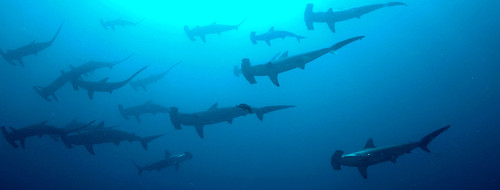 The Shark Trust, in partnership with the Co-operative, is beginning a new project working alongside the commercial fishing industry in Northern England. The Shark Trust has already worked successfully with sectors of the fishing industry and is looking to build on industry knowledge in working towards a long-term sustainable future for shark populations and fisheries in which the Northern English fleet operates.
The Shark Trust, in partnership with the Co-operative, is beginning a new project working alongside the commercial fishing industry in Northern England. The Shark Trust has already worked successfully with sectors of the fishing industry and is looking to build on industry knowledge in working towards a long-term sustainable future for shark populations and fisheries in which the Northern English fleet operates.Vulnerability to overfishing
As apex predators sharks* are a vital component of healthy, balanced marine ecosystems, which in-turn support productive fisheries for more traditional bony fish stocks. However sharks biological characteristics have more in common with mammals than bony fish, exhibiting slow growth, late maturity and few young – traits which leaves them highly vulnerable to overfishing, with populations slow to recover once depleted.
European and British fishermen have long taken sharks for their meat, fins and liver oil and today a wide variety of sharks, skates and rays are taken incidentally in most Northeast Atlantic fisheries. Historically, however, shark catches have been under or misreported, and once-common British species such as the Spiny Dogfish, Common Skate, Angelshark and Porbeagle are now assessed as Critically Endangered, while more than half of all British species are listed as threatened or near threatened on the IUCN (International Union for Conservation of Nature) Redlist.
For shark fisheries to move towards sustainability, scientists and decision-makers need accurate ‘species-specific’ landings data, which is used to better understand the distribution and population structure of individual species. As this improves, the management of shark fisheries and conservation of threatened species will become more effective.
Building on fishing industry knowledge
Focussing on ports in Yorkshire, Humberside, Lancashire and Cumbria gives the Shark Trust an invaluable opportunity to engage with the fishing industry in a region with a strong shark fishing heritage. Initially the project will concentrate on forging links within the commercial fishing industry. From there, recognising existing expertise within the fishing industry, the project will offer training in species identification – particularly for ‘lookalike’ ray, catshark and houndshark species – as well as aiding Industry compliance with legislation applicable to a growing number of sharks, skates and rays. With input from the fishing industry – and acknowledging the nature of working at sea and the often challenging regulatory landscape fishermen now operate within – the Shark Trust will then develop an accessible and practical range of resources.
Ali Hood, Director of Conservation at The Shark Trust said: “The Irish and North Seas support a rich diversity of shark, skate and ray species, many of which have experienced significant population declines in recent decades. The Shark Trust welcomes support from the Co-operative which will enable the Trust to engage practically with the fishing industry in Northern England, working towards a sustainable future for shark fisheries.”
*Unless specifically stated otherwise, shark refers to all elasmobranch fish (sharks, skates and rays).
Source: The Shark Trust
Photo courtesy of ryn413 via Flickr (CC BY 2.0)
